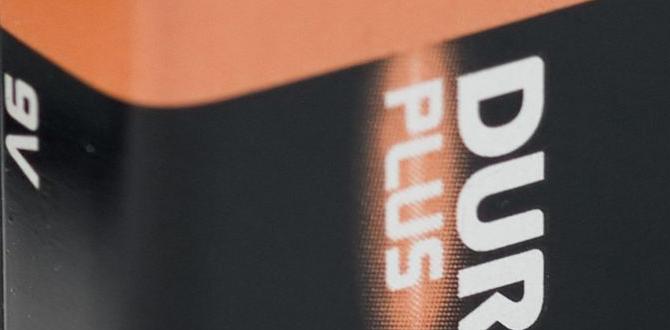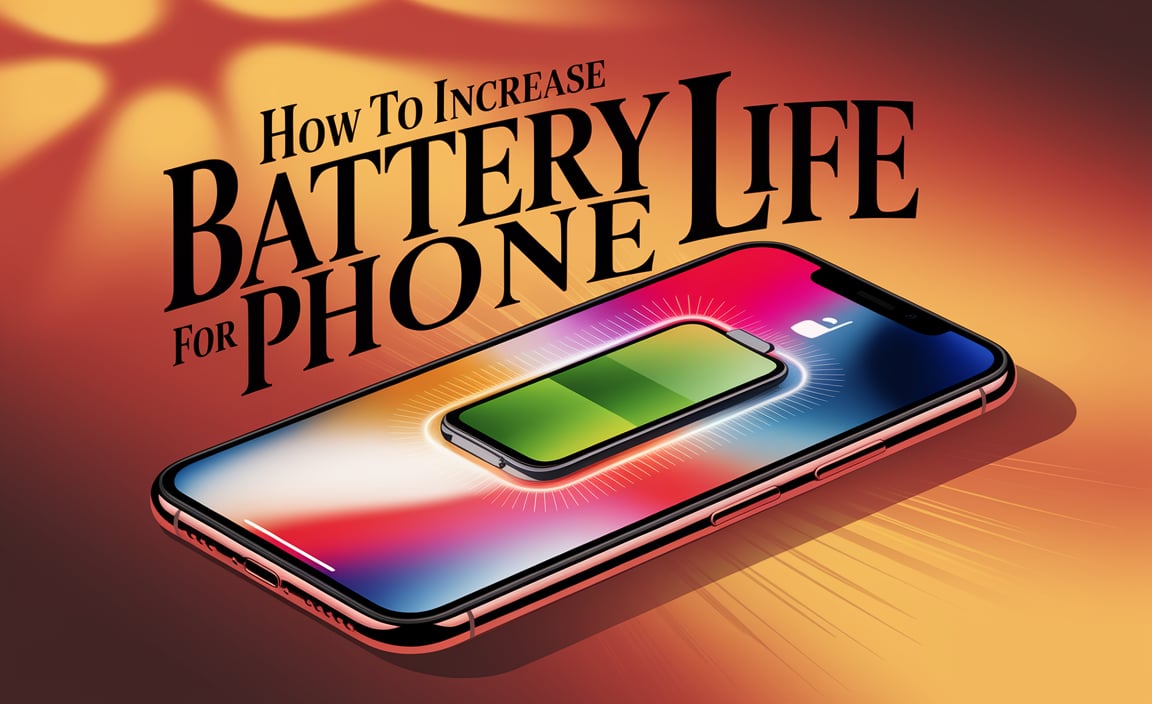Quick Summary: The cost of a battery charger varies widely, from about $15 for simple phone chargers to over $100 for advanced car battery chargers. Expect to pay $20-$50 for a reliable charger for your phone or power bank, and $40-$150 for a good car battery charger. Choosing the right one depends on your needs, battery type, and desired features.
How Much For A Battery Charger: Your Essential Guide to Powering Up
Tired of dead batteries? Whether it’s your phone, car, or that handy power bank, a reliable charger is a must-have. But when you look to buy one, the prices can really jump around! It’s confusing to know what’s a fair price and what you actually need.
Don’t worry, I’m Roy Walker, and I’ve seen my fair share of battery woes. This guide will break down exactly what you can expect to pay for different types of battery chargers. We’ll cover everything from your pocket-sized phone charger to the heavy-duty ones for your car’s battery. You’ll learn what affects the price and how to pick the best one without overspending. Let’s get your devices and vehicle powered up!
Understanding Battery Charger Costs: What Influences the Price?
When you’re asking, “How much for a battery charger?” it’s not a simple one-size-fits-all answer. Several factors play a big role in how much you’ll spend. Think of it like buying a tool – a basic screwdriver is cheap, but a fancy power drill costs more. The same applies to chargers.
Here are the main things that make a difference:
- Charger Type: Is it for a phone, a camera, a laptop, or a car battery? Each has different power needs and complexity.
- Brand: Just like any product, well-known brands often come with a higher price tag due to reputation and perceived quality.
- Features: Does it charge fast? Can it charge multiple devices at once? Does it have smart charging technology that protects your battery? More features usually mean a higher cost.
- Power Output (Amps/Watts): Higher power output chargers can often charge devices faster, and this technology can cost more.
- Battery Type Compatibility: Some chargers are designed for specific battery chemistries (like Li-ion for phones, Lead-Acid for cars). Universal or smart chargers that handle multiple types might be pricier.
- Build Quality and Durability: A charger built with premium materials will likely last longer and cost more than a basic plastic model.
- Safety Certifications: Chargers that have passed rigorous safety tests (like UL or CE certification) might be slightly more expensive but offer peace of mind.
Cost Breakdown: Chargers for Your Everyday Devices
Let’s start with the chargers we use most often – the ones for our phones, tablets, and other portable gadgets.
Phone and Tablet Chargers
These are the most common chargers for a reason! Most people have at least one, and having spares or upgrades is always handy.
- Basic USB Wall Chargers: These are your standard chargers that plug into the wall. They typically provide a single USB port (usually USB-A or USB-C) and charge at moderate speeds.
- Price Range: $10 – $30
- Fast Chargers (Quick Charge, Power Delivery): These use specific technologies to deliver power much faster. They’re great for newer phones and tablets that support these standards. You’ll often see them with higher wattage ratings (e.g., 25W, 45W, 65W).
- Price Range: $20 – $60
- Multi-Port Chargers: If you need to charge your phone, smartwatch, and earbuds all at once, these are lifesavers. They have multiple USB ports, sometimes with a mix of fast-charging and standard ports.
- Price Range: $25 – $70
- Wireless Chargers: While convenient, wireless charging is often a bit slower than wired fast charging. Prices vary based on charging speed and design (e.g., pads, stands).
- Price Range: $15 – $70
Roy’s Tip: When buying a phone charger, always check if it supports the fast-charging standard your phone uses (like USB Power Delivery or Qualcomm Quick Charge). Otherwise, you might be paying for speed you can’t use!
Power Bank Chargers
Power banks are portable batteries that store power to charge your devices on the go. The “charger” for a power bank is actually the cable and power adapter you use to recharge the power bank itself. The cost we usually think about is the power bank itself, but good charging accessories are still important.
If you’re buying a new wall adapter to charge your power bank efficiently:
- Standard USB Adapter: For smaller power banks or older models.
- Price Range: $10 – $25
- Fast USB-C PD Adapter (20W or higher): Recommended for quickly recharging larger capacity power banks.
- Price Range: $20 – $50
The power bank itself can range from $20 for a small 5,000mAh unit to over $100 for a massive 30,000mAh unit with multiple fast-charging ports and even AC outlets.
Laptop Chargers (Adapters)
Laptop chargers are often more specialized and can be pricier because they deliver more power (higher wattage) and have specific connectors. Many laptops use USB-C Power Delivery now, making them more universal.
- Brand-Specific Chargers: Chargers made by your laptop manufacturer.
- Price Range: $40 – $100+
- Universal Laptop Chargers: These come with multiple tip adapters to fit various laptop brands.
- Price Range: $30 – $80
- USB-C PD Chargers (65W to 100W+): If your laptop supports USB-C charging, these are convenient and can often be used for other devices too.
- Price Range: $30 – $90
Car Battery Chargers: Keeping Your Wheels Turning
Car battery chargers are a different ballgame. They are more robust, designed for larger batteries, and often have more sophisticated charging cycles. They are essential for anyone who experiences intermittent battery drain, lives in extreme climates, or has a vehicle that sits for long periods.
When asking “how much for a battery charger” for your car, consider these types:
Basic Car Battery Maintainers (Trickle Chargers)
These are simple devices that provide a very low, slow charge to keep a car battery topped up. They are ideal for vehicles that are stored for extended periods (like a classic car or RV) to prevent the battery from losing its charge.
- Features: Simple, low amperage (e.g., 1-2 amps), designed to prevent overcharging.
- Price Range: $20 – $50
- Best For: Maintaining a battery, not for reviving a deeply discharged one.
Standard Car Battery Chargers
These are more versatile chargers that can charge a typical car battery from a discharged state. They usually offer higher amperage (e.g., 5-10 amps) for faster charging.
- Features: Multiple charging stages, indicator lights, sometimes a “jump start” feature (use with caution!).
- Price Range: $40 – $100
- Best For: Charging a dead or low battery, everyday use for vehicles that are used regularly.
Smart/Automatic Car Battery Chargers
These are the most advanced and recommended for most users. They use microprocessors to monitor the battery’s condition and adjust the charging process accordingly. They can often charge, condition (desulphate), and maintain batteries.
- Features: Multi-stage charging, battery health diagnosis, float charging mode, reverse polarity protection, can often handle different battery types (AGM, Gel, Lithium).
- Price Range: $50 – $150+
- Best For: Optimal battery health, charging various battery types, long-term maintenance, reviving slightly aged batteries.
Heavy-Duty/Industrial Car Battery Chargers
For professional mechanics or those dealing with large vehicles (trucks, RVs, boats) with multiple or very large batteries, these offer high amperage (20+ amps) for rapid charging and robust construction.
- Features: Very high output, often 6V/12V/24V capabilities, robust build, specialized charging modes.
- Price Range: $150 – $400+
- Best For: Fleet vehicles, large battery banks, professional use.
Roy’s Tip: Always check the amperage output of a car battery charger. A charger with too low an amperage will take a very long time to charge a dead battery, while one with too high an amperage (if not smart) could potentially damage a smaller battery. For most cars, a 10-amp charger is a good balance.
Choosing the Right Car Battery Charger: Key Features to Look For
When you’re investing in a car battery charger, you want to be sure it’s going to do the job effectively and safely. With prices varying, it’s good to know what features add value and peace of mind.
Here’s what to consider:
- Battery Type Compatibility: Can it charge your specific battery type? Standard flooded batteries, AGM (Absorbent Glass Mat), Gel, and even Lithium-ion batteries require different charging profiles. Smart chargers usually handle multiple types.
- Amperage Output: This determines how fast the charger works.
- 2 Amps or less: Best for maintenance and trickle charging. Very slow for charging a dead battery.
- 6-10 Amps: Good for most standard car batteries, offering a reasonable charge time.
- 10 Amps or higher: Faster charging, suitable for larger batteries or when time is critical.
- Smart Charging Technology: Microprocessor control is key. It prevents overcharging, optimizes charging cycles, and can help extend battery life through features like desulfation.
- Safety Features: Look for reverse polarity protection (prevents damage if you accidentally connect clamps backward), spark-proof technology, and overload protection.
- Ease of Use: Clear indicators for charging status, simple button operation, and durable clamps that grip securely are important.
- Durability: A rugged casing can protect the charger from bumps and drops, especially if you plan to Tte it in a garage or workshop.
Other Battery Chargers in the Mix
Beyond phones and cars, we interact with many other devices that need charging.
Camera Battery Chargers
Most digital cameras come with their own specific chargers designed for their proprietary battery packs. If you lose it or need a spare:
- Original Equipment Manufacturer (OEM): Bought directly from the camera brand.
- Price Range: $25 – $60
- Aftermarket Chargers: Made by third-party companies. Some are simple drop-in replacements, while others are universal chargers with interchangeable plates to fit different camera battery models.
- Price Range: $15 – $50
Rechargeable AA/AAA Battery Chargers
These are essential for anyone using rechargeable batteries for remotes, toys, flashlights, and more. Prices vary based on the number of batteries they can charge simultaneously and their “smart” features.
- Basic Chargers: Charge 2-4 batteries at a time, often with a simple indicator light.
- Price Range: $10 – $25
- Fast/Smart Chargers: Can charge batteries much quicker (e.g., in an hour or two) and often have individual battery monitoring, battery health checks, and refresh modes.
- Price Range: $20 – $50
Table: Average Costs for Different Battery Chargers
Here’s a quick look at the typical price ranges. Keep in mind these are averages, and prices can fluctuate based on sales, brands, and specific features.
| Charger Type | Typical Price Range | Key Considerations |
|---|---|---|
| Basic Phone Wall Charger | $10 – $30 | Standard charging speed, single port. |
| Fast Phone Charger (USB-C PD/QC) | $20 – $60 | Rapid charging, higher wattage. |
| Multi-Port Phone/Tablet Charger | $25 – $70 | Charge multiple devices simultaneously. |
| Wireless Phone Charger | $15 – $70 | Convenience, often slower than wired. |
| Power Bank Charger (Wall Adapter) | $20 – $50 | Price is for the adapter to charge the power bank, not the power bank itself. |
| Basic Car Battery Maintainer | $20 – $50 | Low amperage, for storage/maintenance. |
| Standard Car Battery Charger (5-10A) | $40 – $100 | Charges dead batteries, moderate speed. |
| Smart/Automatic Car Battery Charger | $50 – $150+ | Multi-stage, battery health, safety features. |
| Camera Battery Charger (Aftermarket) | $15 – $50 | Check compatibility, often includes plates. |
| Rechargeable AA/AAA Charger (Smart) | $20 – $50 | Fast charging, battery health features. |
Car Battery Health and Longevity: Why a Good Charger Matters
Your car battery works hard to start your engine and power all the electronics. Keeping it in good shape is crucial, and that’s where a quality car battery charger comes in. It’s not just about getting your car going when it’s dead; a good charger can actually help your battery last longer.
Modern cars have a lot of technology that can draw power even when the engine is off (like alarms, computers, and sensors). If your car doesn’t get enough driving time to replenish the battery, it can slowly lose its charge. A battery maintainer or a smart charger can keep it topped up, preventing the deep discharge cycles that shorten a battery’s life. For example, the National Renewable Energy Laboratory (NREL) discusses how battery health is critical for vehicle performance and efficiency, highlighting the importance of proper charging.
A smart charger will:
- Prevent Sulfation: Over time, lead-acid batteries can develop sulfate crystals on their plates, which hinders their ability to hold a charge. Many smart chargers have a desulfation mode that can help break these crystals down.
- Optimize Charging: They use multi-stage charging (e.g., bulk, absorption, float) to ensure the battery is charged safely and fully without damaging it.
- Avoid Overcharging: Overcharging can cook a battery, leading to reduced lifespan and potential damage. Smart chargers sense when the battery is full and switch to a low-power float mode.
Investing in a good smart car battery charger, typically in the $50-$150 range, can save you the cost and hassle of premature battery replacement. Remember, a healthy battery means a more reliable car!
Frequently Asked Questions (FAQs)
Q1: What is the cheapest type of battery charger I can buy?
The absolute cheapest chargers are usually basic USB wall adapters for phones or simple trickle chargers for car batteries, often costing around $10-$20. However, they might charge slowly or lack important features.





